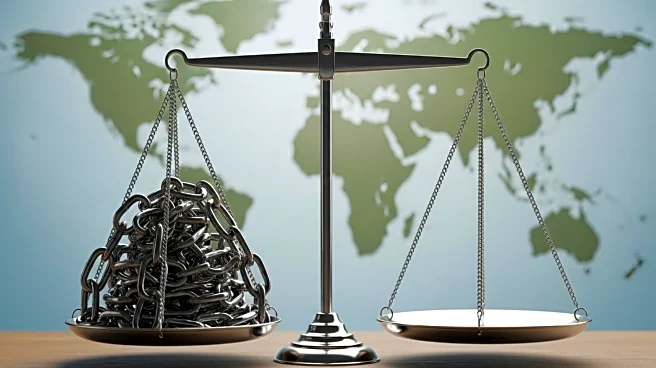What's Happening?
Iranian Foreign Minister Abbas Araghchi has condemned Western efforts to reinstate international sanctions on Iran, describing the move as a 'dangerous precedent' that undermines trust in the global order. Araghchi emphasized that Iran has scaled back its nuclear commitments in accordance with recognized rights, maintaining compliance even after the U.S. withdrew from the 2015 nuclear deal. During a UN Security Council session on non-proliferation, Araghchi accused Germany, France, and the UK of opting for confrontation over dialogue. He labeled the attempts to reimpose sanctions as 'legally void' and urged the Security Council president to declare the decision unlawful. The Security Council recently vetoed a draft resolution to extend the Joint Comprehensive Plan of Action (JCPOA) on Iran's nuclear program, which was submitted by Russia and China. The resolution aimed to delay the 'snapback' mechanism of sanctions set to take effect on September 28, triggered by France and the UK.
Why It's Important?
The reimposition of sanctions on Iran has significant implications for international diplomacy and nuclear non-proliferation efforts. Iran's response highlights the potential erosion of trust in international agreements, which could affect future negotiations and diplomatic relations. The move by Western powers to enforce sanctions may lead to increased tensions in the Middle East, impacting regional stability and global security. The situation also underscores the challenges faced by multilateral institutions like the UN Security Council in maintaining credibility and authority when member states disagree on enforcement measures. The outcome of this dispute could influence how international bodies handle similar situations in the future, affecting global governance and cooperation.
What's Next?
The 'snapback' mechanism of sanctions is set to take effect on September 28, unless further diplomatic efforts alter the course. Iran's stance suggests it will not yield to pressure, potentially leading to further escalation in diplomatic and economic tensions. The international community, particularly the UN Security Council, may face increased scrutiny over its ability to mediate and resolve such conflicts. Stakeholders, including the E3 countries and Iran, may engage in further negotiations to find a resolution, while other nations monitor the situation closely for its impact on global non-proliferation efforts.
Beyond the Headlines
The situation raises ethical and legal questions about the enforcement of international agreements and the role of powerful nations in shaping global policies. The unilateral actions by Western powers could set a precedent for future conflicts, where diplomatic solutions are bypassed in favor of coercive measures. This development may also influence public opinion and political discourse within Iran, potentially affecting domestic policies and international relations.









